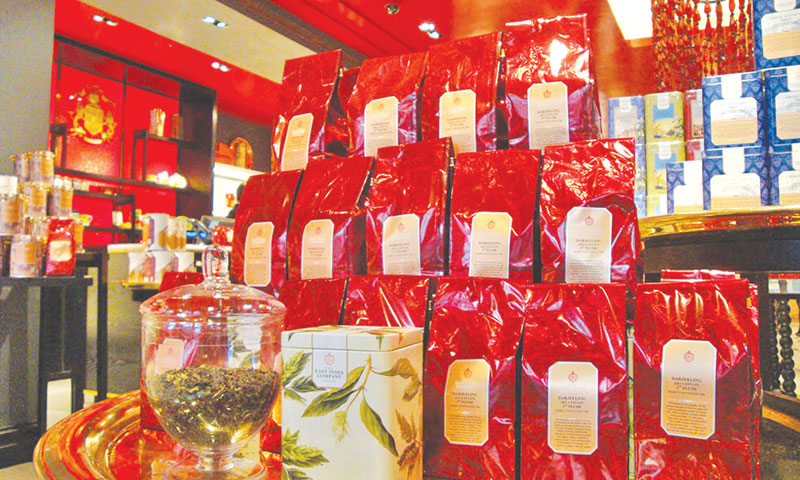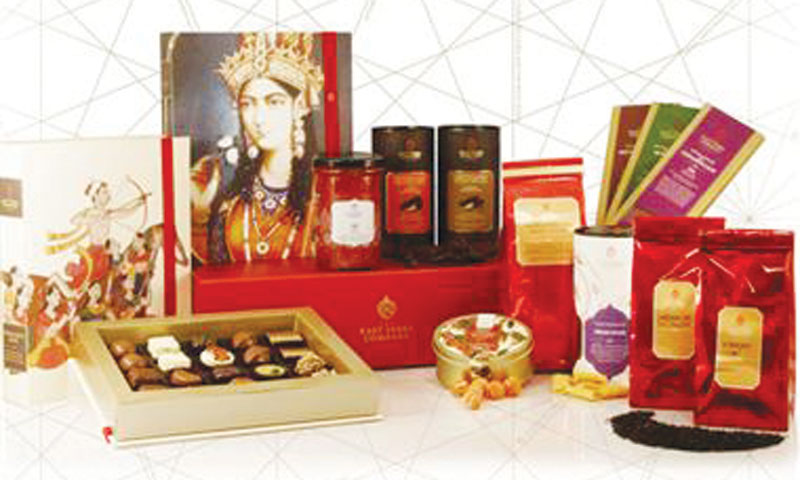It is halfway down a well-regarded street in Mayfair — after a mid-priced English shoe brand, Sotheby’s Realty and a couple of esoteric Japanese fashion labels and a few doors before the Queen’s corsetiere. I passed it several times before stopping to see what it was. On several occasions there were girls at the door handing out freebies. Out of habit I smiled hello, no thank you, without finding out what they were giving away. On the third or fourth occasion I stopped to read the sign above the door: “The East India Company” — in gold Times New Roman or something like it.
Several weeks later, on an aimless Sunday, I wandered in to explore. There was an old German couple drifting out — the wife examining a bowl of what looked like potpourri by the exit. But this is the kind of place where everything looks like potpourri. The store has the cool, dark, familiarity of a luxury gift shop in a Middle Eastern airport — where luxury means genuinely superfluous. Everything is packaged in canisters and jars with gold branding and neatly arranged on dark wooden shelves. There is a rack of decorative porcelain mugs on one side of the room and on the other a number of coffee machines for tastings. In the centre of the room there is a crescent-shaped marble bar with glass pots of tea and a pretty girl from Southhall offering samples.
The East India Company was to its generation, what Amazon will likely be to the next: monstrous, semi-sovereign, monopolistic, life-styling. It was a state-backed, limited liability company incorporated in the seventeenth century to explore the world and trade for the British. Through commerce and political machination, it acquired increasing control over India and eventually colonised the subcontinent before it was absorbed into the British administration. Over its almost three century (first) life, it grew to rule one-fifth of the world’s population, command a standing army of 200,000 men and control half the world’s trade. It was simply “the Company”.
The Company stood for power, adventure, discovery, luxury and class. It did not bring civilisation to the subcontinent. The Mughals of the 17th and 18th centuries were far more sophisticated than the British in many ways. But it brought tea and spices to the West and cheap cloth — calico, gingham, chintz, seersucker and taffeta for example — a clean underwear revolution. Like all corporates, its greatest strength and failing was its pure profit motive. In an age with little regulation and competition, that absolute lack of morality harnessed to extraordinary power generated massive profit and massive harm. The Company played a role in the Bengal Famine of 1770 in which 10 million died, the Boston Tea Party in 1773, the Anglo-Chinese Opium Wars from 1839 to 1842 and 1856 to 1860 and the War of Independence 1857, also known as mutiny; and destroyed local textile and shipbuilding industries. It was finally dissolved in 1874 because of its failures in administration. The grotesque poverty of the subcontinent today is in part a product of its rule.
So its revival comes as something of a surprise. Even more so, given that the resuscitator who has pressed his warm breath between its blue lips is an Indian. Sanjiv Mehta — a businessman with a diverse background in gemology and tea trading — bought the rights to use the East India Company name in 2005.
There are clearly incentives. The East India Company has a name and reputation that provide an obvious platform for a luxury goods retailer. Even more so because we seem to remember the good and none of the bad. It is, in British history, the original bridge to the exotic Orient, bringing tea and pepper and cloves and muslin to the Empire. And in subcontinental history, the Company heralded the British Raj — and brought order to India in a way that none have since. Its recent revival is an exercise in monetising those elements of orientalism and nostalgia and as such its investment appears to be purely in its branding.
Its shop in Mayfair sells tea, coffee, condiments, confectionary and biscuits and a separate arm of the brand mints coins in gold and silver. Its products have the kind of aggrandising descriptions that try terribly hard to provide you the experience you want without having to rely on the product: Persian Blue Salt, Dark Chocolate Enrobed Orange Peel, Admiral’s Reserve Cheese Biscuits and Governor Aungier’s Bombay Chai Tea, for example. I tasted several items but gave up quickly when a lot of it started to taste the same. Savoury biscuits with black peppercorn had the mealiness of sawdust and the sting of cheap deodorant. Roquefort cheese filled biscuits were unfilled — which is some consolation — with the grittiness and flavour profile of road salt. Coffee beans in dark chocolate were pleasant enough if not particularly inspiring. Think Fortnum & Mason without the products or packaging.
Don’t get me wrong — if, on a hungry afternoon, at the back of a cupboard, I chanced upon a dusty jar of its Real Raspberries Enrobed in Chocolate, I’d likely enjoy them notwithstanding my discomfort with their politics and semantics.
But in the end the East India Company’s revival leaves me more than anything else with an unpleasant taste in my mouth. Its gruesome legacy, its orientalism, its poor product selection make this endeavour unwise. In its second incarnation, the Company retains its relentless thirst for profit but little else. And to revive a grand Empire builder as a gift shop — well, it’s like Pol Pot as a Cabbage Patch Kid: embarrassingly distasteful … but perhaps appropriately degrading. If this is an act of revenge, it’s masterful.

















































